
Alexander Sergeyevich Pushkin was a Russian poet, playwright, and novelist of the Romantic era. He is considered by many to be the greatest Russian poet and the founder of modern Russian literature.

The State Historical Museum of Russia is a museum of Russian history located between Red Square and Manege Square in Moscow. The museum's exhibitions range from relics of prehistoric tribes that lived in the territory of present-day Russia, to priceless artworks acquired by members of the Romanov dynasty. The total number of objects in the museum's collection numbers in the millions.

Pavlovsk is a municipal town in Pushkinsky District in the suburban part of the federal city of St. Petersburg, Russia, located 30 kilometers (19 mi) south from St. Petersburg proper and about 4 kilometers (2.5 mi) southeast from Pushkin. Population: 16,087 (2010 Census). Known since late 18 century, when Saint Petersburg was the capital of Russian Empire, as a countryside residence of Russian royal family commissioned creation of the town's landmark -palace with a large park, now parts of its federal museum reserve.
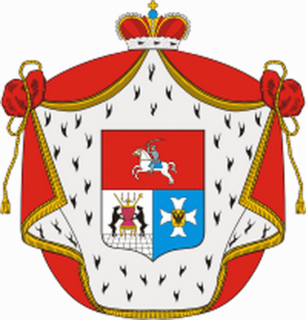
The House of Golitsyn or Galitzine was one of the largest princely of the noble houses in the Tsardom of Russia and Russian Empire. Among them were boyars, warlords, diplomats, generals, stewards, chamberlains, the richest men of Russia, and provincial landlords. Since 1694 Bolshiye Vyazyomy was one of the ancestral estates of the Golitsyns, but many others, like Arkhangelskoye Palace and Dubrovitsy near Podolsk, were owned by different branches or members of the family.
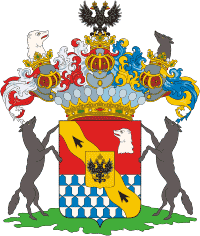
The Stroganovs or Strogonovs, French spelling: Stroganoff, were a family of highly successful Russian merchants, industrialists, landowners, and statesmen. From the time of Ivan the Terrible they were the richest businessmen in the Tsardom of Russia. They financed the Russian conquest of Siberia and Prince Pozharsky's 1612 reconquest of Moscow from the Poles. The Stroganov School of icon-painting takes its name from them. The most recent common ancestor of the family was Fyodor Lukich Stroganov, a salt industrialist. His elder son, Vladimir, became the founder of a branch whose members eventually became state peasants; this lineage continues. The lineage from Fyodor Lukich Stroganov's youngest son, Anikey (1488–1570), died out in 1923. Anikey's descendants became members of the high Russian nobility under the first Romanovs.
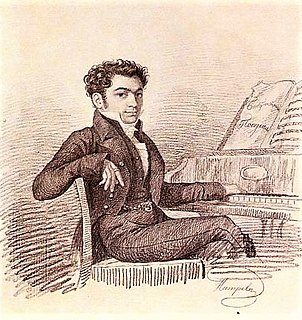
Alexey Nikolayevich Verstovsky was a Russian composer, musical bureaucrat and rival of Mikhail Glinka.
Russian opera is the art of opera in Russia. Operas by composers of Russian origin, written or staged outside of Russia, also belong to this category, as well as the operas of foreign composers written or intended for the Russian scene. These are not only Russian-language operas. There are examples of Russian operas written in French, English, Italian, Latin, Ancient Greek, Japanese, or the multitude of languages of the nationalities that were part of the Empire and the Soviet Union.
Roman Igorevich Tsepov was a Russian businessman and confidant to Vladimir Putin during Putin's work at the Saint Petersburg City Administration. Tsepov was suspected of criminal and corruption activity.

Viktor Vasilyevich Zolotov is the current Director of the National Guard of Russia (Rosgvardiya) and a member of the Security Council of Russia.

The N. P. Osipov State Russian Folk Orchestra is a Russian folk music orchestra. It was founded in 1919 by the balalaika player B. C. Troyanovski.
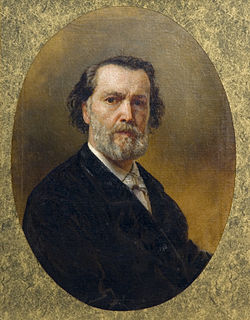
Vladimir Osipovich Sherwood was a Russian painter and architect who worked in Moscow. He was an Eclectics and Russian Revival practitioner, architect of the State Historical Museum on the Red Square in Moscow.

Dmitry Shvidkovsky is a Russian educator and historian of architecture of Russia and the United Kingdom during the Age of Enlightenment. A 1982 alumnus and long-term professor of Moscow Architectural Institute, Shvidkovsky was appointed its rector in 2007.
Turks in Russia, also referred to as Turkish Russians or Russian Turks, refers to people of full or partial ethnic Turkish origin who have either immigrated to Russia or who were born in the Russian state. The community is largely made up of several migration waves, including: descendants of Ottoman-Turkish captives during the Russo-Turkish wars; the Turkish Meskhetian community; and the more recent Turkish immigrants from the Republic of Turkey.

Tatiana Lvovna Shchepkina-Kupernik was a Russian and Soviet writer, dramatist, poet and translator.
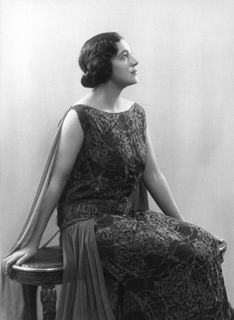
Stella Arbenina, Baroness Meyendorff was a Russian-born English actress.

Benjamin Patersen, or Patersson was a Swedish-born Russian painter and engraver known primarily for his cityscapes.

Ivan Vasiyevich Sherwood-Verny was a Russian Imperial Army officer of English descent. He was known for denouncing the Dekabrist revolt and for this act was awarded the surname Shervud Verny or Sherwood the Faithful by Tsar Nicholas I.

Verderevsky is a Russian noble family from prominent boyars of the Duchy of Ryazan. The Verderevskys are listed in the 6th part of the Ryazanian genealogical book. The Verderevskys were the largest landlords in the Duchy of Ryazan: in the 16th–17th centuries they owned at least 30 allods and about 40 fiefs. Today, descendants of the family live in Russia, Canada and France.
Moscow–Saint Petersburg high-speed railway is a planned high-speed railway line in Russia. According to Russian Railways, construction is scheduled to begin in 2021. The journey time will be approximately 2 hours 19 minutes, and the length of the line will be 679 km.
Anichkovs (Onichkovs) - An ancient Russian noble family.















